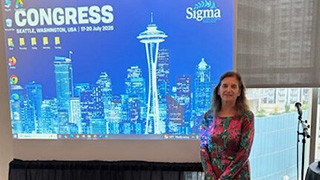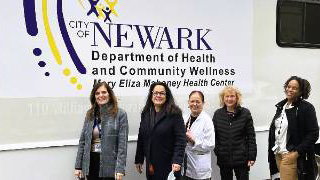Nurse-Led Mobile Health Program Presented in Seattle
Wednesday, August 13, 2025

Joyce Maglione presented research on a clinical training program for M.S.N. students developed through a $3.6 million federal grant.
Joyce L. Maglione, Ph.D., ANP-BC, FNAP, associate professor in the Seton Hall College of Nursing, presented research on an innovative federal training grant at the 36th International Nursing Research Congress in Seattle on July 17. The event, attended by more than 1,000 nurse researchers and participants from 46 countries, was hosted by Sigma Theta Tau International, the Honor Society of Nursing.
Maglione presented, “The Impact of a Mobile Health Clinical Experience that Addresses the Social Determinants of Health," co-authored with Kathleen Neville, Ph.D., R.N., FAAN; Katherine Kuren Black, M.S.N., R.N.; and Theresah Oduro, M.P.A. The research is based on the Mobile Health Training Project (MHTP), launched in July 2022 in partnership with the City of Newark. Funded by a $3.6 million grant from the U.S. Department of Health and Human Services’ Health Resources and Services Administration (HRSA), the four-year initiative is led by Maglione as principal investigator.
The project provides Seton Hall nurse practitioner students with a semester-long clinical experience on mobile health care units operated by the Newark Department of Health and Community Wellness. To date, 91 students have completed the program, with 38 more scheduled to finish by its conclusion in Spring 2026, according to Maglione. Participants are enrolled in the adult-gerontology primary care, pediatric primary care or psychiatric-mental health nurse practitioner programs, and are supervised by Maglione and M.S.N. program directors Diane McClure, R.N., D.N.P., CPNP, APHN-BC, CCAP, CCRN, CEIM and Kathryn Tarpey-Balsamo, M.S.N.

College of Nursing faculty in front of a mobile health unit in Newark.
Maglione emphasized the benefits of community-based clinical experiences for both Seton Hall’s nurse practitioner students and the City of Newark. The project has helped students put into practice core educational concepts such as health equity, social determinants of health (SDOH), culturally competent care, and mobile technology — while advancing access to health care for the community.
“For a city like Newark, mobile health also serves as a platform to expand access to care for underserved populations,” Maglione said.
According to research data from Spring 2023-2025, M.S.N. students taking part in the mobile health clinical experience reported the following outcomes:
- 98% increase in knowledge, skills and confidence related to SDOH.
- 99% increase in knowledge, skills and confidence toward health equity.
- 100% increase in confidence when working with underserved populations.
They also reported an 89% improvement in mobile health technology skills and 90% overall student satisfaction with the clinical experience.
Participant surveys showed that the mobile health experience strengthened students’ communication skills and deepened their understanding of how people in homeless and low-income communities access care. Many students developed strategies to adapt their communication for patients with lower health literacy, and several reflected on the complex social and economic barriers that often prevent individuals from seeking timely care.
Beyond individual student growth, the program has contributed to lasting institutional and community impact. The College has revised curricula to more fully integrate SDOH and health equity into core competencies, and strengthened its partnerships with health centers in underserved neighborhoods.
Much of this success is tied to its strong partnership with the Newark Department of Health and Community Wellness (DHCW), which serves a vulnerable population facing complex health and social issues.
“DHCW’s commitment and coordination have been central to our success,” said College of Nursing Interim Dean Kristi Stinson, Ph.D., R.N., A.P.N.-B.C. “We are grateful for the support of Newark DHCW Chief Operating Officer Alexandria Massey and the dedicated nurse practitioners who serve as preceptors, offering invaluable mentorship and guidance to our students in the field.”
Newark’s DHCW operates two clinics that serve patients of all ages, and three new mobile health units that provide care for medical, pediatric, and psychiatric-mental health populations across the city. “Their support has created an enriching clinical experience that students consistently describe as positive and inspiring,” said Stinson. “Many Seton Hall students express a strong desire to continue in the program, a testament to the collective impact of our program directors and partners.”
Categories: Health and Medicine






